.png?width=610&height=350&mode=crop)
Written by Jared T. Hooper on 10 Jan 2025
Armonica LLC is an indie studio aiming to release their debut title, Detective Instinct: Farewell, My Beloved, before long, and we had the great pleasuring of interviewing the game's director, writer, and composer, Joey, who taught us a ton about their studio, their game, and an even greater deal about the design, history, and potential of adventure games.
---
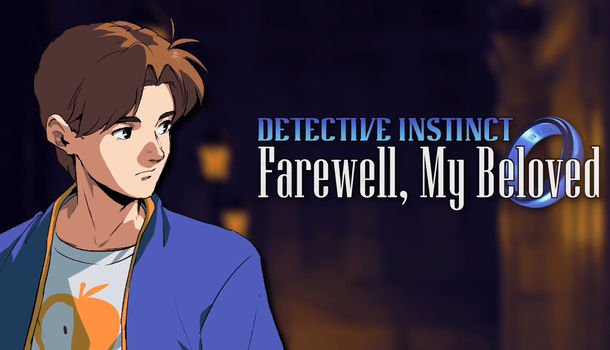
Where did the idea for Detective Instinct's story come from, and how have you gone about crafting it?
There’s a sort of stock storytelling premise that was used in a handful of classic movies called a “vanishing lady” plot, which in its simplest form looks like this: a character goes missing, and when one of that character’s friends/acquaintances/relatives tries to find the missing person, they discover that nobody else seems to recall the missing person ever existing in the first place, which leads the friend/acquaintance/relative down a rabbit hole of conspiracy, questioning their sanity, not knowing who to trust, etc. The most famous example of it is Alfred Hitchcock’s The Lady Vanishes, but there are a few other notable films, like Dangerous Crossing and Bunny Lake Is Missing (a personal favorite). Detective Instinct’s story came from me imagining how you might incorporate that kind of plot into a mystery adventure game, synthesizing it with ADV gameplay systems and storytelling conventions. It turned out to be a really natural fit!
I started with brainstorming various ideas for the plot and characters, then wrote a ten-page or so treatment outlining the overall structure - it was on the strength of this treatment that the rest of our small team committed to the project. The harder part was writing the actual script, which required outlining all of the logic of the game’s myriad conversations and gameplay scenarios on paper before implementing them into the game’s engine. The whole story has actually been fully playable for quite a while; most of the work I’ve done in the past year or so has been refining/editing, but the bones of the thing haven’t changed much since that initial treatment.
Detective Instinct draws inspiration from titles like Hotel Dusk and the Ace Attorney series. What specifically did you draw from these titles and others to create your game?
I’d say Detective Instinct is a bit of a melting pot of various ADV influences. Our gameplay system definitely most closely resembles the Famicom Detective Club series, with its command menu interface and focus on conversation. Our visual style and character portraits are similar to Ace Attorney, especially the original pixel art titles, and our story’s tone is a little like Hotel Dusk, more grounded and focused on human drama. I think fans of any of those games will find a lot that resonates with them, while still feeling like they’ve experienced something with its own unique vibe.
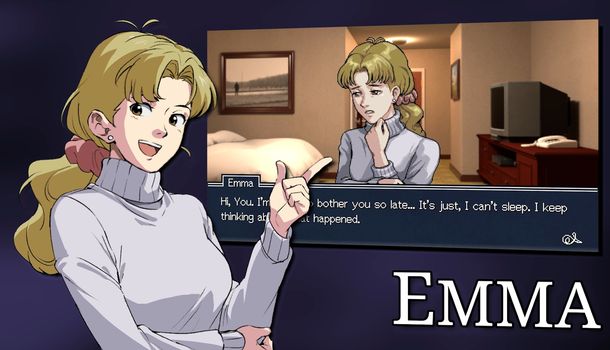
Are there any games in outside genres that influenced the direction of Detective Instinct?
I’m not sure how apparent it is in the end product, but my approach to narrative in video games is heavily influenced by RPGs, especially classic Dragon Quest. Nobody does it better than Yuji Horii!
Would you elaborate on this? What does Yuji Horii do that other developers don't or don't do as well?
There's a lot about Yuji Horii's approach to writing that resonates with me, but one thing that has always stood out is his incredibly light touch. Many of the most emotionally powerful moments in classic Dragon Quest games happen not in cutscenes or elaborate, staged sequences, but in very small interactions that the player is made to discover themselves. Sometimes they're part of the mandatory story progression, sometimes they're totally optional, but they're always very quiet and subtle. The games don't draw attention to them, instead letting the player realize their implications and come to their own understanding. I can think of a couple of examples off the top of my head: a certain tombstone you can find in Dragon Quest VII; a particular town's backstory that has very dark implications for one of your party members in Dragon Quest VI; the deeply tragic culmination of everything you learn about your father, Ortega, in Dragon Quest III; pretty much everything about Dragon Quest V, haha. Having now played The Hokkaido Serial Murder Case: The Okhotsk Disappearance, I can see that same light touch has been a part of Horii's style since the beginning, as that game also has some moments with heavy emotional implications that he deliberately chooses not to linger on or draw attention to. At its best, I think this approach can allow the player to feel more like a part of the game's events, having purely natural reactions to the things they discover, as opposed to the designer telling them explicitly how or what to feel.
That said, I still like games with a more heavy-handed or cinematic approach. I just think Horii's style is really special, and very well-suited to RPGs and adventure games, particularly in the sort of player-insert, silent protagonist style of Dragon Quest. There's really nothing else like it.
What are the non-gaming inspirations for your game?
Detective Instinct borrows a lot from 20th century crime fiction, which would include novelists like Raymond Chandler and James Cain, as well as classic cinema of the 30s/40s/50s. Hitchcock was a huge influence, even beyond The Lady Vanishes, with which our game shares its core premise and train setting.
Other than that, another really important figure for the whole team was mangaka Naoki Urasawa. His stories have a tremendous warmth and maturity to them; Master Keaton in particular was a big influence for all of us, and we’d be thrilled if Detective Instinct manages to capture even a tiny fraction of that series’ feel and tone. You might see some aspects of his art style in our character designs, too.
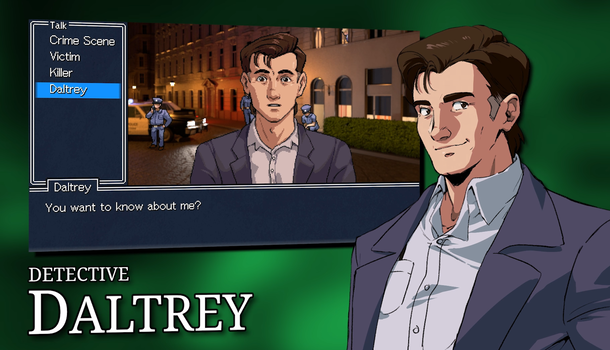
Based on the technology, fashion, and vehicle models, your game seems to take place in the 80s or 90s. Is there a specific reason your game's story would take place before the turn of the millennium?
When initially planning the game, we wanted to try setting it contemporaneously, but once I started writing the script, I realized that the events of the story as I’d outlined it in the treatment felt more plausible in a pre-internet, pre-cell phone context. It’s totally possible to write a good mystery story with modern technology, and there are plenty of adventure games that do it - the upcoming Urban Myth Dissolution Center has social media snooping as a central mechanic, the Retro Mystery Club games give you a cell phone option in the command menu, and so does Emio - The Smiling Man, despite also being set ambiguously in the ‘90s - but it wasn’t something I wanted to account for in this story, so it just made more sense to push it back to pre-2000s. I think it fits well with the game’s retro aesthetic, too.
What sort of experience are you hoping for players to have?
More than anything, I hope players are moved by the story and have a lot of fun experimenting with commands and hanging out with all of the game’s characters. Our goal was to tell an earnest and interesting story through command menu gameplay, so if people feel any genuine emotions when they play, we’ll all be very happy.
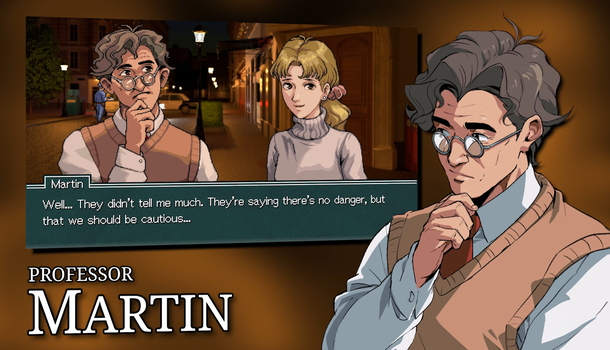
How do you go about creating puzzles and mysteries for the player to solve? What's your goal in creating a puzzle or mystery for the player to solve?
In a sense, each character interaction in the game is a puzzle where the player has to follow trails of information and their own curiosity in order to navigate through conversations; this is the true essence of command-menu gameplay. We want to challenge the player to pay attention and be thorough in their interrogations and investigations, while also allowing each character’s personality to shine through in how they respond to your commands.
Rika Suzuki (the writer of Another Code and Hotel Dusk, among many other ADV games) has said that the puzzles in CiNG’s games were always intended to complement the story, first and foremost; I’d say the same is true for us. We’re not trying to really stump everyone with challenging brain teasers like Professor Layton or something, the real goal is to immerse players in our story and characters.
What's your process for composing the game's soundtrack? What are you hoping the music will accomplish?
Other than just wanting to write memorable and emotional tunes with strong melodies, I really wanted Detective Instinct’s score to sound different from other games in the genre. One way I approached this was by mostly avoiding synths, which are a pretty identifying element of both the Ace Attorney and Famicom Detective Club scores. Almost everything in our score is arranged with acoustic instruments, with a focus on piano, guitar, and strings, much of which were performed with real instruments/players. I also didn’t really want it to sound like jazz, which is pretty common in modern hard-boiled mystery stories - Hotel Dusk would be a good example of that. I’d say it sounds very ‘60s or ‘70s, has a little bit of rock influence with some orchestral textures.
In terms of process, I don’t really have one set way of composing; sometimes an idea comes to me randomly, sometimes I find something while noodling around on the guitar, sometimes I just open a blank page of sheet music software and try to will the music into being, haha. I will say to any aspiring composer - one of the best things you can do is always record/save every random idea you have, because when you’re trying to come up with ideas in the middle of a project, it helps to have a large repository to go back to for inspiration. Many of the songs in Detective Instinct’s score are built off of stray ideas I recorded long before we ever started developing the game!
I read a Tweet of yours that urged titles like Famicom Detective Club, Ace Attorney, and Hotel Dusk be labeled as adventure games, not visual novels. In your opinion, what is the distinction between an adventure game and a visual novel?
One of our followers @toku_yayoi posted a really great thread on this subject, which I encourage everyone to read: [Twitter Thread]
For those that can’t, though, I’ll summarize: command-select adventure games have been around since the ‘80s, and the term “visual novel” was coined in the late ‘90s specifically to distinguish the kinds of games it was referring to from command-select adventures. This is an oversimplification, but the defining feature of visual novels is that they require very little player input outside of a few choices that can alter the direction the narrative takes. Some of the earliest games in this tradition would be Chunsoft’s Otogiriso and Banshee’s Last Cry, and this style would become extremely popular on PCs in the late ‘90s and 2000s. Games like Ace Attorney, Famicom Detective Club, and Hotel Dusk far more closely resemble the original adventure game tradition, with more involved gameplay systems and narratives that only have one outcome. Unfortunately, very little of this history is widely known in the west, because most of the early games in the genre weren’t localized; I suspect this confusion happened because by the time Japanese adventure games like Ace Attorney started to become known in the west, the games they most closely resembled to the western gaming community of the time would have been those aforementioned PC visual novels, which had pretty influential English-speaking fandoms online.
This is one simple way to think about it: every visual novel is an adventure game, but not all adventure games are visual novels, because the term was created to delineate a specific kind of adventure game. Ironically, in the west, it’s sort of become the opposite; people call basically any game with a focus on story and lots of text a visual novel, to the point that even RPGs like Persona are often tagged as visual novels on Steam!
Personally, I don’t mind if people want to call these games visual novels if they have attachment to the term, but I think doing so can obscure the real history behind the genre and make it more difficult to see where various games fit into that history. The term is so widespread in the west that trying to correct the record is probably a losing battle, but for anyone who’s interested in these kinds of games, it can’t hurt to have a little more knowledge about where the term comes from and what it was originally used for.
Another great resource on this topic is a video our friend Bowl of Lentils made a while back, which I always recommend people check out: [Bowl of Lentis Video]
He also linked to this interview with the creator of Ace Attorney, Shu Takumi, who also agrees that the Ace Attorney games are not novel games: [Shu Takumi Interview]
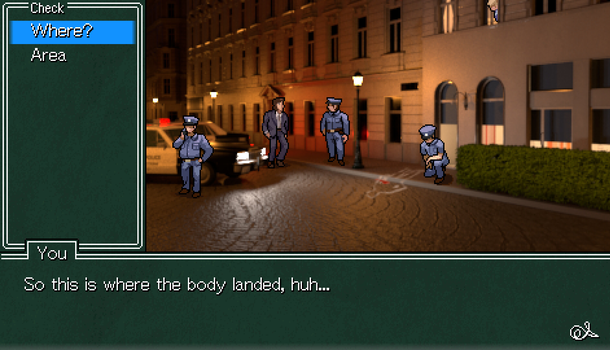
You've also praised command menus to no end. Would you like to explain what makes them so great, particularly to gamers who might be turned off by this feature?
The command menu is a very flexible gameplay system. In the case of games like Detective Instinct or Famicom Detective Club, it basically turns conversations with NPCs into puzzles, where players can use deductive reasoning to figure out how to get information out of characters and advance the story.
I think the thing that turns some players off from the command menu initially is that they’re used to games where menu options always have one specific, consistent function, and are surprised when command menu games often have options that don’t always do the same thing, or need to be selected more than once to advance the narrative. But the important thing to remember is that when you use a command, you’re telling your player character to do something, and the response you get for doing that thing naturally SHOULD change depending on the context of the scene.
This will sound like a non-sequitur, but bear with me: just the other day, I was watching a friend play Pokemon: HeartGold, and he got to a part where the player disguises himself as one of the bad guys to sneak into their secret hideout in Goldenrod City. Most players presumably will just make a beeline for the secret hideout from the place where you get the disguise, but the curious player might wonder: since I have access to the entire city, what would happen if I went somewhere else while still in this disguise? What would people say if someone who looks like one of the evil members of Team Rocket went into their house and talked to them? What would the people who know you think if you talked to them while wearing the disguise? Would they recognize you?
These are not questions Pokemon games expect you to ask, and appropriately, the disguise had absolutely no effect on what any of the NPCs we talked to said. But in a command menu game, you ARE expected to ask these kinds of questions, about even the smallest changes in context; for example, a character’s mood/expression. If a character seems sad or reserved, they may not say much to you if you ask them any questions; but, if you find a way to make them laugh, you may improve their mood, and suddenly things they wouldn’t talk to you about before they’ll be a little more open about if you try the same commands.
Alternatively, the command menu can surprise you: for example, you might try to leave an area, only to be interrupted by an on screen character telling you not to go. The Famicom Detective Club games have a tradition of cheekily requiring you to use the “Quit Investigation” command at certain points in the story, which makes sense in the logic of the scene but is unexpected because it’s usually just used to save the game - kind of like how you need to use the Pray command in Earthbound during a critical battle. The best command menu games thrive on this kind of mechanical playfulness, and once you adapt to how they work, they’re incredibly immersive. Basically, the commands themselves don’t always change, but if the scene’s context does - in even the slightest way - then they may have a different effect, and the essence of the game is recognizing those changes in context and how they might affect the commands the game makes available to you.
Of course, we recognize that problems can arise in this style of game - you might not always pick up on the logic the game designer expects you to, and if you get really stuck, you might feel compelled to brute force solutions by selecting every command until the game finally lets you proceed. But I think the immersive potential of command menu games at their best is worth the risk of some players either getting stuck or not really adapting to how the game wants you to think. At least in our case, we tried to be very forgiving and nudge players in the right direction, either through carefully written dialogue or with optional hints. Like I said before, we’re not trying to really stump people; we just want players to feel immersed in our story and characters, and if you approach the command menu with the right mindset, it will really elegantly facilitate that.
You've displayed a great passion for this genre on your Twitter account. What is it that you love so much about adventure games? What draws you to them, and what sorts of experiences do they provide that other games don't?
The thing that inspired Yuji Horii to create The Portopia Serial Murder Case - in many ways the most important and influential game in Japanese adventure game history - was simply that he thought it sounded interesting to try making a game that progressed through conversations between a human and a computer. That’s what it’s all about for me: there’s no better genre for exploring characters, because so much of this genre is based primarily on face-to-face conversations. You can learn about and form relationships with characters in a really personal way in this genre, which makes it a very compelling storytelling medium. I honestly think it has limitless potential, even beyond mystery games.
Many of the adventure games mentioned so far are mystery or detective stories. Are these the genres you're most taken with in adventure games, or do you think these sorts of narratives lend themselves well to the gameplay mechanics?
I do think mysteries lend themselves well to games, since games can theoretically realize the dream of becoming that hard-boiled detective from classic movies/books/etc, finding clues, making deductions, catching the culprit, etc. Ironically, though, I don't actually think it's this that makes the adventure games we love so successful, because even though they often involve mysteries in one way or another, in none of them is the player actually asked to make large-scale deductions to solve an overall case. Even in Ace Attorney, you're only really asked to find very specific contradictions with the evidence you collect - it's the characters who actually reveal the overall mysteries and guide the story to its conclusion.
In other words, the point of many of these games is not for the player to "solve the mystery," broadly speaking - it's for them to become immersed in the events of the story and connect with the game's characters, just like any of the great works of mystery fiction. For example, take Famicom Detective Club. Yoshio Sakamoto (writer/producer of the series) talks about this in a recent interview about Emio [editor's note: interview is in Japanese and site might require connecting to a Japanese server via a VPN to access] - when asked about FDC's relationship to mystery/puzzle solving games, he says that the experience of playing FDC is intended to be akin to watching a movie or TV drama, hence him preferring the genre label "interactive drama". Actually, another interview with Sakamoto and Kaori Miyachi (assistant producer on Emio) was just published [a few days ago], and Miyachi sums it up very succinctly in one of her responses: "The mechanics of the Famicom Detective Club games are not about unraveling cleverly devised tricks to identify the culprit, but rather, focus on depicting human beings."
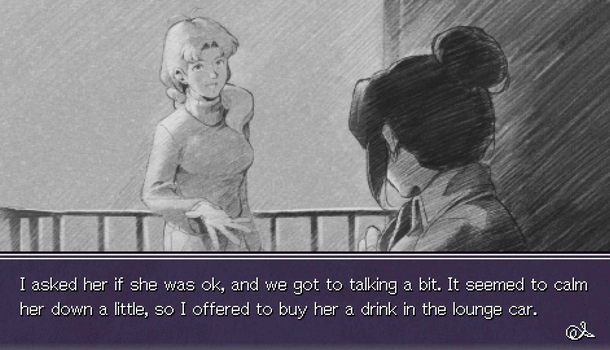
Are there non-mystery/detective adventure games you also enjoy?
In terms of non-mystery games in this genre - I'd put Snatcher and Policenauts more in the conspiracy/thriller category, and they're both great!
In this genre whose main appeal is the stories it tells, which adventure game do you think has the best story?
Oh, I could never pick a favorite - I like so many ADV series for so many different reasons! Instead, I'll just highlight one that I think sometimes gets overlooked, especially in America: Hotel Dusk's sequel, Last Window: The Secret of Cape West. It was never released in America, so people here don't have the same nostalgic attachment to it that they have for Hotel Dusk, but it's well worth tracking down. In my mind, it takes everything Hotel Dusk was doing and refines it to perfection. Don't listen to anyone who tells you it's a lesser clone of Hotel Dusk, it is really so much more.
Do you have a favorite character across all the adventure games you've played?
I don't know if I can really answer this one either, but since I have Hotel Dusk/Last Window on the mind, let's give it to Rachel! Who among us doesn't wish we could have an ambiguously flirtatious relationship with our boss's beautiful secretary, whom we never see in person and only ever interact with over the phone, and whose theme song is utterly gorgeous?
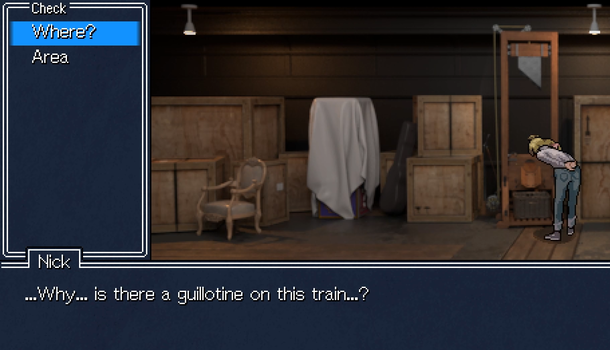
The Ace Attorney games are a breakout hit in the genre, and the recent remake and revival of Another Code and Famicom Detective Club have generated some buzz, but for the most part, the genre is still mostly niche. Do you think there's a chance adventure games as a whole can reach a degree of prominence among the wider gaming sphere, and if so, what do you think it'll take to reach that prominence?
I think Ace Attorney is a bit of an outlier, because there are many aspects of its storytelling and characters that have allowed it to sustain a large and extremely passionate fan community in a way that I don’t really see happening for things like Another Code or Famicom Detective Club, both of which have a much more understated appeal. And maybe that’s for the best - I wouldn’t want those games to be any other way. I don’t think it’s likely this genre will ever be a major player in the wider gaming culture, but I do think it’s primed to go from a small niche to a healthy and vibrant niche, spurred on by people’s nostalgia for games like Hotel Dusk and new games like Emio and the Another Code remake continuing to bring attention to it. Hopefully we can be a part of that, too!
Do you mind explaining the exact differences that set Ace Attorney apart from something like Another Code that a wider audience has latched onto?
I'm sure I could think of a lot of things, but for one, Ace Attorney has a cast of extremely colorful and iconic characters with very flashy designs and personalities, and their relationships to one another are just ambiguous enough to invite the fandom to speculate and fantasize about them endlessly. The courtroom setting and central mechanic of pointing out contradictions also lends itself very well to the kind of bombastic, exciting storytelling that hooks everyone on the series from the very first case.
Compare that to Another Code, which is far more internal and grounded. You can make endless memes about Edgeworth, or Godot, or Maya, or anyone in the core Ace Attorney cast, really, but you're not gonna see many people making memes about, I don't know, Matthew from Another Code R, an utterly normal thirteen year old boy who misses his dad and has lasting trauma from various family tragedies. This isn't to say Ace Attorney's storytelling is comparatively immature or something - Shu Takumi is an exceptional writer, and Ace Attorney's cast has emotional depth in spades - but it has that kind of flavor that really encourages hype and audience participation. Rika Suzuki's games aren't really interested in that, and neither is Famicom Detective Club - they're much more about everyday people and simple human drama. This can give them an exceptional emotional resonance, but it's more personal - you're not popping off when you play something like Another Code or Emio - The Smiling Man, you're reflecting on the lives of the characters and your own. It's not hard to see why something like Ace Attorney would have a more broad appeal.
But I'd of course encourage anyone who likes Ace Attorney to try some of these other ADV series. You might be surprised just how affecting they can be!
Do you have any favorite moments from adventure games?
Decorating a Christmas tree in Hotel Dusk comes to mind; it’s such a sweet, lovely little moment. The ending of Yuji Horii’s The Hokkaido Serial Murder Case: The Okhotsk Disappearance also stands out. It has this really melancholy, lonely feel to it, and the recent remake of that game has an additional scenario that builds on it in a really compelling way.
Sort of ironically, there’s a sequence in Famicom Detective Club: The Girl Who Stands Behind that always cracks me up, because it’s so obtuse: you go to a woman’s house because she tells you she has a friend coming over who might be able to help you with your investigation. You exhaust all possible dialogue options, and the friend still hasn’t shown up. You think to yourself that there’s a bar in the area that may be relevant to the case, so you call them and tell the woman you’re going to step out for a bit. You go to the bar, talk to everyone there, get no useful information, then return to the woman’s house. The woman’s friend STILL hasn’t arrived, and you’re just awkwardly sitting there with absolutely nothing else to talk about with the woman, so you decide to go BACK to the bar - but, before you leave, the woman asks you to leave a phone number so she can get in contact with you when the friend arrives. You leave, go back to the bar, and eventually she calls you to tell you her friend’s there, so you go back to her house.
I can see why some people would find a sequence like that maddening, and there’s certainly nothing quite that obtuse in Detective Instinct, but I think the absurdity of the situation is very funny, and oddly really immersive. You have to contend with the awkwardness of sitting in this woman’s house with nothing to talk about while you wait for her friend to arrive, the exhaustion of finding no relevant information in the bar, mildly irritating the woman as you keep restlessly going back and forth from there and her house… It just feels very real in a way only Famicom Detective Club games are bold enough to be.
Where does your team name Armonica LLC come from?
Music was my first passion, so when trying to come up with a name for the company, I gravitated towards things that sounded vaguely musical. There's not much more to it than that - "Armonica" is just a nonsense word that sounds a bit musical and rolls off the tongue well!
Would you mind introducing your team members and their roles?
Sure! My name’s Joey (Twitter, Bluesky), and I’m the game’s director. I wrote the story and am also the composer.
Our two lead artists are Prism ([Twitter, Bluesky), and Picto (Twitter,Bluesky). They’re responsible for the character designs, the pixel art, and the 3D backgrounds. We also have Jeto (Twitter, Bluesky) handling most of our cutscene illustrations and much of our promotional artwork.
Our programmer is Kasumi Twitter, Bluesky).
We’ve also had a few other freelance artists come through the project; Quak (Bluesky) helped us finish some of our pixel art, and JMV (Twitter, Bluesky) helped us with some storyboards and a bit of key art early in development. Our close friend Adam Ferguson (Twitter, Bluesky) made some pixel art backgrounds in the game. A few freelance musicians recorded parts for us, as well: Andrew Dunn (Twitter, Bluesky) on cello, Jeff Ball (Twitter, Bluesky) on violin/viola, and a local player Ankita Prasad on a few other violin parts.
How did your team come together?
Prism/Picto (they’re brothers) and I met on pixel art message boards in the late 2000s. We mostly fell out of touch when we went to college, but reconnected through our mutual friend Adam (the aforementioned Adam Ferguson) during the pandemic. The group of us realized we all had a passion for this kind of game and very similar artistic/storytelling sensibilities, so it was a no-brainer that we’d eventually work together on something. They brought in their friend Kasumi to program, and the rest is history!
How long has your team been at work on your game?
I sent a message in our Discord server that I was going to write a story for an adventure game on February 4th, 2022. You can think of the game as having been in development since that moment, haha. Almost 3 years!
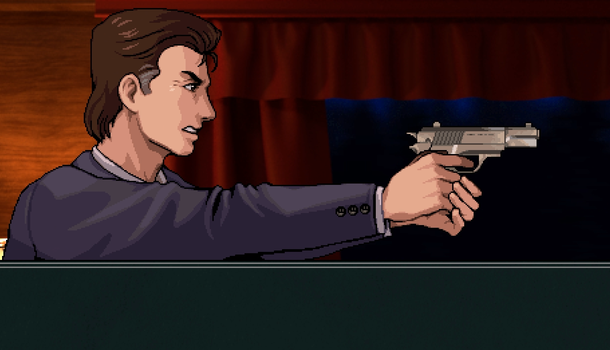
What sorts of challenges have you run into while developing your game?
When we first started development, the group of us had nothing but time, so we were able to make a ton of progress relatively quickly. Various life events eventually changed that, so the biggest challenge has just been keeping up with progress in spite of the fact that none of us are able to work on the game full-time. Scope-wise, an adventure game of this scale doesn’t seem like it should be out of reach, but you’d be surprised how labor-intensive it is, especially to finish all of the necessary artwork. That’s pretty much it, though - otherwise, the game has been an absolute joy to develop, easily the most fulfilling project I’ve ever been a part of.
Is there anything in particular on the development side you're proud of that you've accomplished?
This project marks a lot of firsts for me, so I’m pretty excited about all of it! I’m so incredibly lucky to be able to work with a team of friends this talented, and I’m immensely proud of them and grateful for their work.
Your plan had been to release Detective Instinct at the end of 2024 but pushed it back to early 2025 to further refine it. Do you have a new release date in mind or just a time frame as of right now?
It’s hard to say, but we’re at least confident enough to confirm the game will definitely release in 2025.
At the moment, your game is only available in English, though you are working on translating it into Japanese. How are you going about this translation, and do you hope to translate your game to other languages?
We tried to design the game in such a way that translation would always be possible, but localization is a big and potentially very expensive commitment, so the Japanese demo translation is our way of testing the waters and seeing if it’s a commitment we’re capable of taking on. We’d love for the game to be available in other languages, of course, but we have no concrete plans beyond what’s been currently announced.
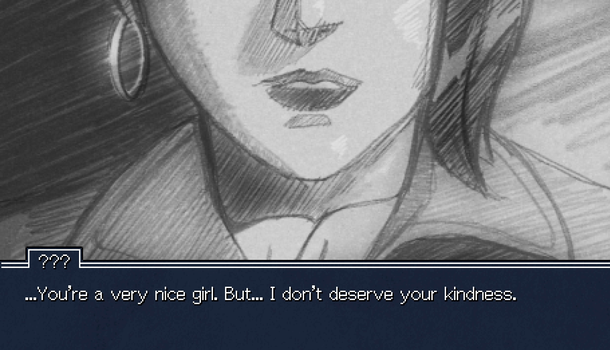
Once Detective Instinct is out for the world to enjoy, do you have any plans for what your team will create next?
I wrote the story of Detective Instinct to be standalone, without much interest in leaving it open for sequels, but over time, some ideas have come to me about how I could make other games with some of these characters. We have no real plans for any follow-ups, though - we’re just focused on getting this one released in the best possible state we can. If it’s successful, who knows? Maybe we’ll make a sequel, or maybe we’ll make something totally different! The only thing I’ll add is that apparently, the vast majority of developers on Steam only ever release one game. I don’t know if the next thing I make will be a Detective Instinct sequel, but I can at least promise you this: Armonica LLC will NOT be a one-game developer. :)
Is there anything I haven't asked about that you would like to talk about?
If you follow our social media, you’ll notice that we lean a lot on our inspirations when it comes to marketing Detective Instinct, which is a bit of a necessary evil; it’s really hard to build an audience without appealing to their existing interest in games that came before, especially for self-published indie developers making a game in a genre as niche as this. But I hope it’s clear we didn’t set out to create a clone of our inspirations, whether that’s Ace Attorney, Famicom Detective Club, Hotel Dusk, or anything else. We wanted to make something familiar enough to appeal to fans of the genre, but very much with its own unique texture and identity. Hopefully, when you play Detective Instinct, it won’t remind you of any one game or series in particular, but of a myriad of things, all of which come together such that the game doesn’t feel quite like anything but itself.
Do you have any parting words or messages for players and potential fans?
The response we’ve received from fans has been immensely gratifying, far exceeding our expectations, and we can’t thank them enough for their interest and for spreading the word about our game. As always, if you’re interested in Detective Instinct, the best thing you can do for us is tell your friends and add us to your Steam wishlist.
We can’t wait for everyone to finally get a chance to play the full game this year, and we’ll do our best to get it out to you all as soon as possible! :)
---
Joey is one of the most passionate people I've spoken with, and that passion pervades not just this interview, but every pixel of his team's game, Detective Instinct: Farewell, My Beloved, which should be seeing a release sometime in the near future on PC and Nintendo Switch.
Follow updates on the studio's Twitter and/or Bluesky and join their Discord if you're as crazy about adventure games as Joey and his team are, and we thank Joey for not only taking the time to answer our many questions, but do so in such great detail.

Just writing about the video games that tickle my fancy when the fancy strikes.
posted by Dawffyd on 10 Jan 2025
posted by Ross Liversidge on 09 Jan 2025
posted by Caitlyn C. Cooper on 06 Jan 2025
posted by Richard Durrance on 10 Dec 2024
posted by Caitlyn C. Cooper on 22 Nov 2024
posted by Caitlyn C. Cooper on 31 Oct 2024
posted by Caitlyn C. Cooper on 28 Oct 2024